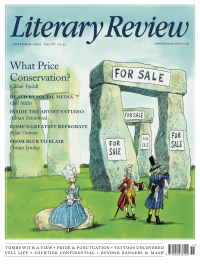David Jays
Just Dance
Mr B: George Balanchine’s Twentieth Century
By Jennifer Homans
Granta Books 769pp £35
‘Ballet is woman.’ ‘There are no mothers-in-law in ballet.’ These celebrated dicta of George Balanchine, the Russian-born choreographer who co-founded New York City Ballet (NYCB) and established ballet as a modern art, always irk me. Yes, ballet is woman – if you wear worshipful blinkers. Yes, messy social relations resist expression in dance – if they don’t interest you. Each statement seems to say more about Balanchine than his art.
Jennifer Homans’s reflective biography – a mammoth tour of a life staring in tsarist Russia and ending on the eve of perestroika – doesn’t discuss the mother-in-law quote, but from the very beginning Homans notes how Balanchine’s imagination was divorced from messy reality. Nothing was more vivid to him than ‘the unreal world of the stage’.
Born in 1904, Balanchine perhaps experienced more than enough reality before he reached twenty, coming of age ‘surrounded by trauma and violence on an epic scale’. His was a precarious childhood, a shuttle between idyll and uncertainty. His mother won a fortune in Russia’s state lottery, his father squandered it. Balanchine’s memories of childhood were faulty but persistent, finding expression most notably in his Nutcracker, a fantasy of Russian childhood turned cornerstone of American ballet. As Homans has it, these memories were ‘jewels he would sew into the hem of his mind and carry with him out of Russia’.
He tried to gain a place in St Petersburg’s Imperial Cadet Corps, a sure path to advancement for children of low social standing, but ended up at the Imperial Ballet. It set the course of his life. It wasn’t just the chance to peer through the keyhole at

Sign Up to our newsletter
Receive free articles, highlights from the archive, news, details of prizes, and much more.@Lit_Review
Follow Literary Review on Twitter
Twitter Feed
Under its longest-serving editor, Graydon Carter, Vanity Fair was that rare thing – a New York society magazine that published serious journalism.
@PeterPeteryork looks at what Carter got right.
Peter York - Deluxe Editions
Peter York: Deluxe Editions - When the Going Was Good: An Editor’s Adventures During the Last Golden Age of Magazines by Graydon Carter
literaryreview.co.uk
Henry James returned to America in 1904 with three objectives: to see his brother William, to deliver a series of lectures on Balzac, and to gather material for a pair of books about modern America.
Peter Rose follows James out west.
Peter Rose - The Restless Analyst
Peter Rose: The Restless Analyst - Henry James Comes Home: Rediscovering America in the Gilded Age by Peter Brooks...
literaryreview.co.uk
Vladimir Putin served his apprenticeship in the KGB toward the end of the Cold War, a period during which Western societies were infiltrated by so-called 'illegals'.
Piers Brendon examines how the culture of Soviet spycraft shaped his thinking.
Piers Brendon - Tinker, Tailor, Sleeper, Troll
Piers Brendon: Tinker, Tailor, Sleeper, Troll - The Illegals: Russia’s Most Audacious Spies and the Plot to Infiltrate the West by Shaun Walker
literaryreview.co.uk